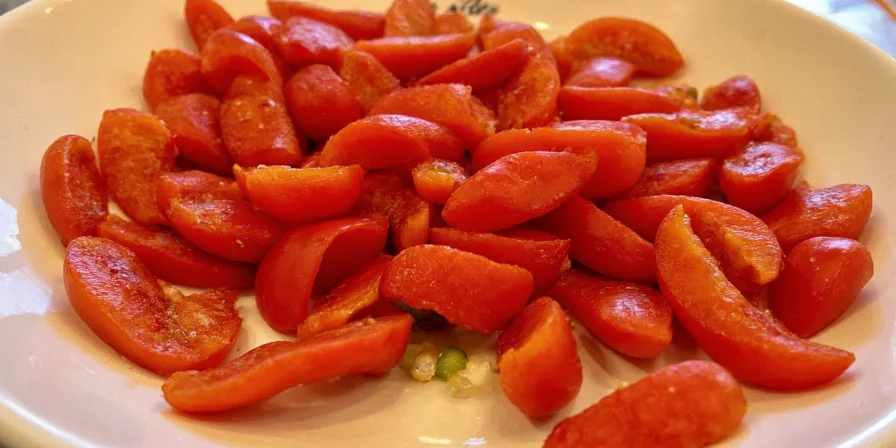What’s Paprika? A Deep Dive into the World of This Vibrant Spice
Paprika is more than just a colorful garnish; it is a spice that can elevate your culinary creations to new heights. Known for its vibrant red color and distinct flavor, paprika is a staple in various cuisines around the globe. This blog post will explore what paprika is, its different varieties, how to use it effectively in your cooking, and essential storage hacks to keep this spice fresh for longer.
Understanding Paprika
Paprika is made from grinding dried capsicum peppers, which belong to the nightshade family. The flavor can range from sweet to smoky, depending on the type of peppers used and the region they are grown in. The spice is particularly popular in Hungarian, Spanish, and Portuguese cuisines, where it is used to flavor stews, soups, and rice dishes.
Types of Paprika
- Sweet Paprika: This is the most common type, known for its mildly sweet flavor. It is often used in dishes for color and flavor without adding heat.
- Smoked Paprika: Also known as pimentón, this variety is dried over oak wood, giving it a rich, smoky flavor. It is commonly used in Spanish cuisine.
- Hot Paprika: Made from spicier varieties of peppers, this paprika adds heat to dishes. It is less common but excellent for those who enjoy some kick.
- Hungarian Paprika: This type is known for its deep, rich flavor and is available in several grades, from mild to hot.
Using Paprika in Cooking
Incorporating paprika into your cooking can enhance the flavor profile of your dishes. Here are some tips on how to use paprika effectively:
1. Seasoning Basics
Paprika can be used as a seasoning for a variety of dishes. Here are some ideas:
- Soups and Stews: Add a teaspoon of sweet paprika to enrich the flavor and color of your soups and stews.
- Meats: Rub paprika onto chicken, pork, or beef before grilling or roasting for added flavor.
- Vegetables: Sprinkle paprika over roasted or sautéed vegetables for a pop of color and taste.
- Rice and Grains: Stirring paprika into rice or quinoa dishes can add depth and enhance the overall flavor.
2. Colorful Garnishes
Paprika is often used as a garnish to add color and visual appeal to dishes. Here’s how to do it:
- Deviled Eggs: A sprinkle of paprika on top of deviled eggs gives them a beautiful finish.
- Potato Salad: Dusting paprika over potato salad adds both flavor and visual interest.
- Hummus: A swirl of paprika on top of hummus can make the dish more inviting.
3. Balancing Flavors
Using paprika can help balance flavors in your dishes. Here are some tips:
- With Acidity: If your dish is too acidic, a pinch of paprika can help mellow the flavors.
- In Rich Dishes: Paprika can cut through the richness of creamy sauces and dishes, providing a nice contrast.
- With Heat: If a dish is too spicy, adding sweet paprika can help tone down the heat.
Storage Hacks for Paprika
To get the most out of your paprika, proper storage is essential. Here are some effective storage hacks:
1. Keep It Cool and Dark
Heat and light can degrade the quality of paprika over time. Here’s how to store it:
- Use Dark Containers: Store paprika in dark glass or opaque containers to protect it from light.
- Avoid Heat Sources: Keep paprika away from the stove and other heat sources to prevent degradation.
2. Airtight Containers
Proper sealing is vital to maintaining freshness:
- Use Airtight Jars: Transfer paprika to airtight glass jars to keep moisture and air out.
- Label and Date: Always label your containers with the type of paprika and the date of purchase.
3. Check for Freshness
Over time, spices can lose their potency:
- Smell Test: If your paprika doesn’t have a rich aroma, it may have lost its flavor.
- Color Check: Fresh paprika should be vibrant red. If it appears faded, it may be time to replace it.
Conclusion
Paprika is a versatile spice that can bring life to any dish. Understanding its different varieties, knowing how to use it effectively, and practicing proper storage techniques can ensure that this vibrant spice remains a staple in your kitchen. Whether you prefer sweet, smoky, or hot paprika, incorporating it into your meals can add depth and flavor, making your cooking more enjoyable and flavorful.

Sample Recipe Using Paprika
| Recipe | Ingredients | Instructions |
|---|---|---|
| Smoky Paprika Chicken |
|
1. Preheat oven to 400°F (200°C). 2. Rub chicken with olive oil and seasonings. 3. Place on a baking tray and roast for 30-35 minutes until cooked through. |










 浙公网安备
33010002000092号
浙公网安备
33010002000092号 浙B2-20120091-4
浙B2-20120091-4